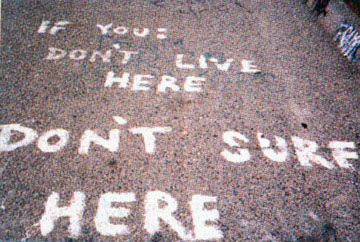
The locals had a reputation for short tempers, thuggery and a ruthless pecking order. That meant little to the invaders, whose ego-driven arrogance was fueled by a self-image saturated with superiority. The two sides clashed in a violent confrontation. The uninvited visitors were beaten back, and the locals showed them no mercy.
Now where in the world of modern surfing did this happen? Velzyland? Cactus? Palos Verdes? Burleigh? Stockton Avenue? The Canaries? The Ranch? Narrabeen? Could be any one of dozens of intense surf spots around the globe, couldn't it?
But no, the above is not about a specific example of surfer localism per se. It's about the single most violent episode in all of human history: the battle of Stalingrad during World War II. The Nazi army had advanced rapidly for a thousand miles deep into the Russian heartland when Soviet dictator Josef Stalin told his generals that there would be no more retreat, and that

they were to stand their ground to the death. And thus were revealed deep-seated human instincts of conquest, violence, and revenge, resulting in the deaths of almost a million soldiers and civilians in a little less than six months.
What greater contrast could there be? Warfare-to-the-death that destroys a city is about as far as you can get from riding aqua blue energy in warm water along beautiful coastlines, where the power and the visions provided by our mother ocean combine to make surfing an almost religious experience. However, if our sport/art is indeed so wonderful, then "surf rage" reveals something that, I contend, is born of the exact same primal instincts that caused ten thousand deaths a day during the siege of Stalingrad. That was man at his worst, and violence amongst surfers, blessed as we are by Nature, is pretty much in the same category.
If you think that comparing Nazis and Soviets to surfers is a bit of a stretch, then consider the following from the Los Angeles Times dated March 26, 2000. Titled "Drought Desperation", the article relates the story of a battle between monkeys and humans when water trucks arrived at a drought-stricken trading post in northern Kenya. When the monkeys saw the water, they attacked so ferociously that the humans were forced to retreat as the primates quenched their thirst. But the humans re-grouped and fought back the simians with axes and machetes. Sounds like the first day of waves after a long flat spell at Sunset or Swamis or Kirra, no? And you can take the simile even one step further when talking about conflict over water: there was a once fight involving a machete at the Ranch, where gunshots have also been used to intimidate outsiders.
All this is by way of introduction to my take on what has been the single most shameful and disgraceful aspect of our sport/art for the last forty years. One has only to talk to those who have quit surfing in disgust, or those in the non-surfing public who are unable to comprehend how surfers can reveal such base human instincts when they are so blessed by the ocean, to understand how localism and violence have stained the soul of surfing.
In early April of this year Chris Bystrom called with the idea of my writing about "surf rage" in response to the recent assault on Nat Young. His account of what had happened was pretty depressing, especially since at the time I was writing up a summary of Surfrider's Clean Water Classic event at Rincon, where we are able to run a weekend contest in great waves without security or water marshals and with the full cooperation of all the local Santa Barbara surfers. (see accompanying article)
Yet here was Chris describing Nat's serious injuries caused by a conflict in the water at Angourie. So on one hand I was filled with the satisfaction of being a part of a wonderful event where hundreds of surfers cooperated in sharing great waves at one of the most crowded breaks in the world. But on the other I was sadly reminded that surfers are also capable of being reduced to the level of primates by their selfishness and lack of self-control.
Surfing is as pure a pleasure as anything we do on this planet. The beauty, the sensation and the physical challenge of riding waves are unmatched by any other sport. But surfing's internal conflicts are also unique. They affect our surfing lifestyle across the board. In fact, it seems as though our "culture" is bookended by bullshit.